Daily Writing
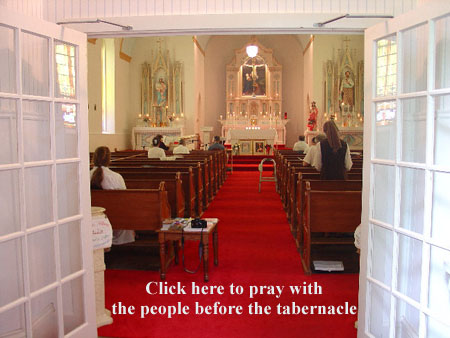
| Shepherds of Christ Daily Writing |
 |
January 9, 2010
|
January 10th Holy
Spirit Novena |
The Novena Rosary
Mysteries |
China Retreat
January 10th - 13th
Please come & pray with us!
We are going to St. Boniface
January 10th - 8:00 & 10:00 Masses
with Fr. Joe
Sunday - January 10th
1:30pm & 6:20pm sessions
Monday - January 11th
Mass - 12 noon
1:30pm & 6:20pm sessions
Tuesday - January 12th
Retreat - 10:00am Rita
Mass - 12 noon
1:00pm - 2:00pm Rita
6:20pm prayers as usual
Wednesday -
January 13th
12:00 - 13th Service
Mass - 2:00pm
Please pray for a special intention.
January 9, 2010
Isaiah 42: 7
to open the eyes of the blind,
to free captives from prison,
and those who live in darkness
from the dungeon.
A person can be blind
Isaiah 42: 16
I shall lead the blind by a road they do not know, by paths they do not know I shall conduct them. I shall turn the darkness into light before them and the quagmires into solid ground. This I shall do — without fail.'
Isaiah 43: 8
Bring forward the people that is blind, yet has eyes, that is deaf and yet has ears.
Matthew 11: 5
the blind see again, and the lame walk, those suffering from virulent skin-diseases are cleansed, and the deaf hear, the dead are raised to life and the good news is proclaimed to the poor;
Matthew 15: 14
Leave them alone. They are blind leaders of the blind; and if one blind person leads another, both will fall into a pit.'
God gives us the scriptures
We have the liturgy
We have spiritual writers
The Fathers of the Church
Doctors of the Church
We have the Holy Spirit to enlighten us
Order is in all God creates
Everything in creation bears the
handprint of God
We don't own our bodies — we are
stewards of our bodies for God —
John 15: 1-8
I am the true vine,
and my Father is the vinedresser.
Every branch in me that bears no fruit
he cuts away,
and every branch that does bear fruit
Sing: We Have Been Told
Blind cannot see
A secular person — enriches himself
at the cost of the other
Hebrews Chapter 11
Only faith can guarantee the blessings that we hope for, or prove the existence of realities that are unseen. It is for their faith that our ancestors are acknowledged.
It is by faith that we understand that the ages were created by a word from God, so that from the invisible the visible world came to be.
It was because of his faith that Abel offered God a better sacrifice than Cain, and for that he was acknowledged as upright when God himself made acknowledgement of his offerings. Though he is dead, he still speaks by faith.
It was because of his faith that Enoch was taken up and did not experience death: he was no more, because God took him; because before his assumption he was acknowledged to have pleased God. Now it is impossible to please God without faith, since anyone who comes to him must believe that he exists and rewards those who seek him.
It was through his faith that Noah, when he had been warned by God of something that had never been seen before, took care to build an ark to save his family. His faith was a judgement on the world, and he was able to claim the uprightness which comes from faith.
It was by faith that Abraham obeyed the call to set out for a country that was the inheritance given to him and his descendants, and that he set out without knowing where he was going. By faith he sojourned in the Promised Land as though it were not his, living in tents with Isaac and Jacob, who were heirs with him of the same promise. He looked forward to the well–founded city, designed and built by God.
It was equally by faith that Sarah, in spite of being past the age, was made able to conceive, because she believed that he who had made the promise was faithful to it. Because of this, there came from one man, and one who already had the mark of death on him, descendants as numerous as the stars of heaven and the grains of sand on the seashore which cannot be counted.
All these died in faith, before receiving any of the things that had been promised, but they saw them in the far distance and welcomed them, recognising that they were only strangers and nomads on earth. People who use such terms about themselves make it quite plain that they are in search of a homeland. If they had meant the country they came from, they would have had the opportunity to return to it; but in fact they were longing for a better homeland, their heavenly homeland. That is why God is not ashamed to be called their God, since he has founded the city for them.
It was by faith that Abraham, when put to the test, offered up Isaac. He offered to sacrifice his only son even though he had yet to receive what had been promised, and he had been told: Isaac is the one through whom your name will be carried on. He was confident that God had the power even to raise the dead; and so, figuratively speaking, he was given back Isaac from the dead.
It was by faith that this same Isaac gave his blessing to Jacob and Esau for the still distant future. By faith Jacob, when he was dying, blessed each of Joseph’s sons, bowed in reverence, as he leant on his staff. It was by faith that, when he was about to die, Joseph mentioned the Exodus of the Israelites and gave instructions about his own remains.
It was by faith that Moses, when he was born, was kept hidden by his parents for three months; because they saw that he was a fine child; they were not afraid of the royal edict. It was by faith that, when he was grown up, Moses refused to be known as the son of Pharaoh’s daughter and chose to be ill–treated in company with God’s people rather than to enjoy the transitory pleasures of sin. He considered that the humiliations offered to the Anointed were something more precious than all the treasures of Egypt, because he had his eyes fixed on the reward. It was by faith that he left Egypt without fear of the king’s anger; he held to his purpose like someone who could see the Invisible. It was by faith that he kept the Passover and sprinkled the blood to prevent the Destroyer from touching any of their first–born sons. It was by faith they crossed the Red Sea as easily as dry land, while the Egyptians, trying to do the same, were drowned.
It was through faith that the walls of Jericho fell down when the people had marched round them for seven days. It was by faith that Rahab the prostitute welcomed the spies and so was not killed with the unbelievers.
What more shall I say? There is not time for me to give an account of Gideon, Barak, Samson, Jephthah, or of David, Samuel and the prophets. These were men who through faith conquered kingdoms, did what was upright and earned the promises. They could keep a lion’s mouth shut, put out blazing fires and emerge unscathed from battle. They were weak people who were given strength to be brave in war and drive back foreign invaders. Some returned to their wives from the dead by resurrection; and others submitted to torture, refusing release so that they would rise again to a better life. Some had to bear being pilloried and flogged, or even chained up in prison. They were stoned, or sawn in half, or killed by the sword; they were homeless, and wore only the skins of sheep and goats; they were in want and hardship, and maltreated. They were too good for the world and they wandered in deserts and mountains and in caves and ravines. These all won acknowledgement through their faith, but they did not receive what was promised, since God had made provision for us to have something better, and they were not to reach perfection except with us.
Abraham had faith
Abraham did everything God asked for
God never abandons us
Ruth 1: 1, 3-6, 14-16, 22
In the days when the Judges were governing, a famine occurred in the country and a certain man from Bethlehem of Judah went—he, his wife and his two sons—to live in the Plains of Moab.
Elimelech, Naomi’s husband, died, and she and her two sons were left. These married Moabite women: one was called Orpah and the other Ruth. They lived there for about ten years. Mahlon and Chilion then both died too, and Naomi was thus bereft of her two sons and her husband. She then decided to come back from the Plains of Moab with her daughters–in–law, having heard in the Plains of Moab that God had visited his people and given them food.
They started weeping loudly all over again; Orpah then kissed her mother–in–law and went back to her people. But Ruth stayed with her.
Naomi then said, ‘Look, your sister–in–law has gone back to her people and to her god. Go home, too; follow your sister–in–law.’
But Ruth said, ‘Do not press me to leave you and to stop going with you, for
wherever you go, I shall go,
wherever you live, I shall live.
Your people will be my people,
and your God will be my God.This was how Naomi came home with her daughter–in–law, Ruth the Moabitess, on returning from the Plains of Moab. They arrived in Bethlehem at the beginning of the barley harvest.
We see how a Moabite woman
becomes the grandmother of King David —
Old Testament
Samuel defeats the Philistines
Saul is anointed King by Samuel the prophet
1 Samuel 9: 1-4, 17-19: 10: 1
Among the men of Benjamin was a man called Kish son of Abiel, son of Zeror, son of Becorath, son of Aphiah; a Benjaminite and a person of rank. He had a son called Saul, a handsome man in the prime of life. Of all the Israelites there was no one more handsome than he; he stood head and shoulders taller than anyone else.
Now since the donkeys belonging to Kish, Saul's father, had strayed, Kish said to his son Saul, 'My son, take one of the servants with you and be off; go and look for the donkeys.' They went through the highlands of Ephraim, they went through the territory of Shalishah, and did not find them; they went through the territory of Shaalim but they were not there; they went through the territory of Benjamin and did not find them.
When Samuel saw Saul, Yahweh told him, 'That is the man of whom I said to you, "He is to govern my people." ' Saul accosted Samuel in the gateway and said, 'Tell me, please, where the seer's house is.' Samuel replied to Saul, 'I am the seer. Go up ahead of me to the high place. You must eat with me today. Tomorrow, when I let you go, I shall tell you whatever is on your mind.
Samuel took a phial of oil and poured it on Saul's head; he then kissed him and said, 'Has not Yahweh anointed you as leader of his people Israel? You are the man who is to govern Yahweh's people and save them from the power of the enemies surrounding them. The sign for you that Yahweh has anointed you as prince of his heritage is this:
1093 BC Saul defeats the Philistines
But Saul is disobedient to Samuel —
Saul is rejected by God for disobedience
to Samuel —
Young David had a courageous victory
over the Philistine giant Goliath
1 Samuel 17: 32-33, 37, 40-51
David said to Saul, 'Let no one be discouraged on his account; your servant will go and fight this Philistine.' Saul said to David, 'You cannot go and fight the Philistine; you are only a boy and he has been a warrior since his youth.'
'Yahweh,' David went on, 'who delivered me from the claws of lion and bear, will deliver me from the clutches of this Philistine.' Then Saul said to David, 'Go, and Yahweh be with you!'
He took his stick in his hand, selected five smooth stones from the river bed and put them in his shepherd's bag, in his pouch; then, sling in hand, he walked towards the Philistine. The Philistine, preceded by his shield-bearer, came nearer and nearer to David. When the Philistine looked David up and down, what he saw filled him with scorn, because David was only a lad, with ruddy cheeks and an attractive appearance. The Philistine said to David, 'Am I a dog for you to come after me with sticks?' And the Philistine cursed David by his gods. The Philistine said to David, 'Come over here and I will give your flesh to the birds of the air and the wild beasts!' David retorted to the Philistine, 'You come to me with sword, spear and scimitar, but I come to you in the name of Yahweh Sabaoth, God of the armies of Israel, whom you have challenged. Today, Yahweh will deliver you into my hand; I shall kill you, I shall cut off your head; today, I shall give your corpse and the corpses of the Philistine army to the birds of the air and the wild beasts, so that the whole world may know that there is a God in Israel, and this whole assembly know that Yahweh does not give victory by means of sword and spear — for Yahweh is lord of the battle and he will deliver you into our power.'
No sooner had the Philistine started forward to confront David than David darted out of the lines and ran to meet the Philistine. Putting his hand in his bag, he took out a stone, slung it and struck the Philistine on the forehead; the stone penetrated his forehead and he fell face downwards on the ground. Thus David triumphed over the Philistine with a sling and a stone; he hit the Philistine and killed him, though he had no sword in his hand. David ran and stood over the Philistine, seized his sword, pulled it from the scabbard, despatched him and cut off his head.
When the Philistines saw that their champion was dead, they fled.
1085 BC Birth of David, son of Jesse —
Saul defeated at Mount Gilboa —
• forsaken by God —
• his son's killed
• takes his own life
David had lots of sons
1 Samuel 16: 1-13
Yahweh said to Samuel, ‘How much longer do you mean to go on mourning over Saul, now that I myself have rejected him as ruler of Israel? Fill your horn with oil and go. I am sending you to Jesse of Bethlehem, for I have found myself a king from among his sons. Samuel replied, ‘How can I go? When Saul hears of it he will kill me.’ Yahweh then said, ‘Take a heifer with you and say, “I have come to sacrifice to Yahweh. Invite Jesse to the sacrifice, and I shall reveal to you what you must do; and you will anoint for me the one I indicate to you.
Samuel did what Yahweh ordered and went to Bethlehem. The elders of the town came trembling to meet him and asked, ‘Seer, is your coming favourable for us, he replied. ‘I have come to sacrifice to Yahweh. Purify yourselves and come with me to the sacrifice.’ He purified Jesse and his sons and invited them to the sacrifice.
When they arrived, he looked at Eliab and thought, ‘This must be Yahweh’s anointed now before him, but Yahweh said to Samuel, ‘Take no notice of his appearance or his height, for I have rejected him; God does not see as human beings see; they look at appearances but Yahweh looks at the heart. Jesse then called Abinadab and presented him to Samuel, who said, ‘Yahweh has not chosen this one either. Jesse then presented Shammah, but Samuel said, ‘Yahweh has not chosen this one either. Jesse thus presented seven of his sons to Samuel, but Samuel said to Jesse, ‘Yahweh has not chosen these. He then asked Jesse, ‘Are these all the sons you have?’ Jesse replied, ‘There is still one left, the youngest; he is looking after the sheep.’ Samuel then said to Jesse, ‘Send for him, for we shall not sit down to eat until he arrives. Jesse had him sent for; he had ruddy cheeks, with fine eyes and an attractive appearance. Yahweh said, ‘Get up and anoint him: he is the one! At this, Samuel took the horn of oil and anointed him, surrounded by his brothers; and the spirit of Yahweh seized on David from that day onwards. Samuel, for his part, set off and went to Ramah.
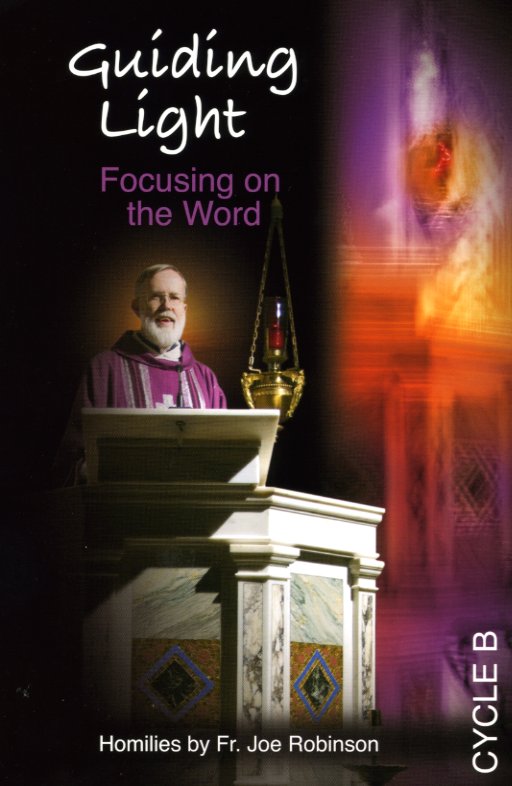
4th Sunday of
Advent
2 Samuel 7: 1-5
Once the king had settled into his palace and Yahweh had granted him rest from all the enemies surrounding him, the king said to the prophet Nathan, 'Look, I am living in a cedar' wood palace, while the ark of God is under awnings." Nathan said to the king, 'Go and do whatever you have in mind, for Yahweh is with you.' But that very night, the word of Yahweh came to Nathan: 'Go and tell my servant David, "Yahweh says this: Are you to build me a temple for me to live in?
December 18, 2005
INTRODUCTION: (2 Samuel 7,1-5, 8b-12, 14a,16; Luke 1,26-38) Our first reading goes back 1000 years before Christ to the time of king David in Jerusalem. You need to recall that when Moses led the people of Israel out of Egypt, almost 300 years before King David, God gave the people a special sign of his presence among them. That sign was the Arc of the Covenant. It looked something like this: a box in which were placed the 10 Commandments, a lid of gold and on the lid were two angels. The box was carried by two long poles because no one could touch the Arc. The two angels provided a throne for their invisible God, Yahweh. As Moses and the people moved through the desert and eventually into the promised land, the Arc was kept in a tent. Only designated people, and eventually only the high priest, could enter the tent and offer sacrifice to God. The Arc was still kept in a tent during the reign of King David. David had built himself a nice comfortable palace and he decided it was not right that the Arc, the special sign of God’s presence with his people, was still kept in a tent. So he told his prophet, Nathan, that he would build a temple, a house for God. Nathan said “good idea,” but God said “no.” God said David had shed too much blood in his role as king, so he would have David’s son, Solomon, build the temple after David died. But God was pleased with David’s idea and blessed him. One of the special blessings David received was that David’s line would never die out. One of his descendants would always be king over God’s people. That’s what is meant by the statement that God would “establish a house” for David. For about 400 years this proved to be true. Always the king of Judea was of the royal house of David. When the Babylonians conquered the Jews, that was the end of the kingship. But the Jews never forgot the promise God made to David and always waited for one who would come from David’s family who would rescue God's people from their enemies and restore the kingdom to Israel. Since kings were anointed when they assumed power, the king they looked for was called the anointed one – the Hebrew word for “anointed one” is Messiah, in Greek the word is Christos. In the gospel of the annunciation, the angel Gabriel informs Mary that her son would be the fulfillment of these hopes. “The Lord God will give him the throne of David his father, and he will rule over the house of Jacob forever, and of his kingdom there will be no end.”
Solomon was the son of David —
His mother was Bathsheba,
who was the widow of Uriah
Rehaboam was son of Solomon
Rehaboam was the King of Judah —
(The Kingdom had split)
Jeroboam King of Israel
Jeroboam worships golden calves
Jeroboam sets up idols in Israel.
910 Elijah predicts famine in Israel —
it happens
Elijah taken to heaven in a whirlwind —
Sixteenth Sunday of Ordinary Time
‘Disaster for the shepherds who lose and scatter the sheep of my pasture, Yahweh declares. This, therefore, is what Yahweh, God of Israel, says about the shepherds who shepherd my people, "You have scattered my flock, you have driven them away and have not taken care of them. Right, I shall take care of you for your misdeeds, Yahweh declares! But the remnant of my flock I myself shall gather from all the countries where I have driven them, and bring them back to their folds; they will be fruitful and increase in numbers. For them I shall raise up shepherds to shepherd them and pasture them. No fear, no terror for them any more; not one shall be lost, Yahweh declares!
Look, the days are coming,
Yahweh declares,
when I shall raise an upright Branch
for David;
he will reign as king and be wise,
doing what is just and upright
in the country.
In his days Judah will triumph
and Israel live in safety.
And this is the name he will be called,
‘Yahweh–is–our–Saving–Justice.’ "
Psalm 23
Yahweh is my shepherd, I lack nothing.
In grassy meadows he lets me lie.By tranquil streams he leads me
to restore my spirit.
He guides me in paths of saving justice
as befits his name.Even were I to walk in a ravine as dark as death
I should fear no danger, for you are at my side.
Your staff and your crook are there to soothe me.You prepare a table for me
under the eyes of my enemies;
you anoint my head with oil;
my cup brims over.Kindness and faithful love pursue me
every day of my life.
I make my home in the house of Yahweh
for all time to come.
Ephesians 2: 13-18
But now in Christ Jesus, you that used to be so far off have been brought close, by the blood of Christ. For he is the peace between us, and has made the two into one entity and broken down the barrier which used to keep them apart, by destroying in his own person the hostility, that is, the Law of commandments with its decrees. His purpose in this was, by restoring peace, to create a single New Man out of the two of them, and through the cross, to reconcile them both to God in one Body; in his own person he killed the hostility. He came to bring the good news of peace to you who were far off and peace to those who were near. Through him, then, we both in the one Spirit have free access to the Father.
Mark 6: 30-34
The apostles rejoined Jesus and told him all they had done and taught. And he said to them, ‘Come away to some lonely place all by yourselves and rest for a while’; for there were so many coming and going that there was no time for them even to eat. So they went off in the boat to a lonely place where they could be by themselves. But people saw them going, and many recognised them; and from every town they all hurried to the place on foot and reached it before them. So as he stepped ashore he saw a large crowd; and he took pity on them because they were like sheep without a shepherd, and he set himself to teach them at some length.
July 19, 2009
HOMILY
There was a man who worked in a museum whose job it was to explain the different exhibits. On one occasion he pointed to the bones of a dinosaur saying the bones were 100 million and 9 years old. Someone asked how they could date those bones so accurately. He said “well, when I started working here, I was told these bones were 100 million years old and I’ve worked here for nine years.”
Today I want to give everyone a little history lesson. I’m not going back to the dinosaurs, but I am going back pretty far – to King David, 1000 years before Christ. When I was in school, I hated history. It wasn’t until we studied the history of the Old Testament in the seminary that I began to appreciate it. I cannot cram 1000 years of history into a couple of minutes. I just want to touch on the parts of Jewish history that are mentioned in today’s reading. If you want to learn more, read everything in the Old Testament, but be sure you have a commentary to help you. Otherwise, you’ll give up in despair because you won’t know what it’s all about - especially the prophets and the historical books.
When David was king 1000 years before Christ, David wanted to build a house for God, since there was no Temple for God at that time. God did not give David permission to do so, however God promised David through the prophet Nathan that he would bless him and build David a house in the sense that David’s kingdom would continue forever and one of his descendants would always rule. This blessing lasted through the reign of David’s son, Solomon; but we humans somehow have the ability to sabotage God’s blessings. Solomon turned to pagan gods and over-extended the country financially by elaborate building projects and exorbitant taxes, so when Solomon died there was a rebellion and most of Israel broke away from Solomon’s successor, David’s grandson, Rehoboam. Rehoboam continued to rule over the southern part of Israel, the area we know as Judaea . For 400 years (and this is amazing) the kings of Judaea were descendants of King David. The northern kingdom that rebelled against David’s successors suffered under a succession of kings and rebellions. In less than 300 years the northern kingdom was destroyed by the Assyrians, people from northern Iraq. About 100 years after that, the Babylonians from southern Iraq conquered the Assyrians and took control of the entire Middle East. The conquest of the Babylonians brings us up to Jeremiah whom we heard in today’s first reading. At the time of Jeremiah, here was the situation: the northern kingdom no longer existed. The southern kingdom, Judaea, was still being ruled by David’s descendants but they were not loyal to God or to God’s laws. Jeremiah spoke to these kings as they came into power, the last four being: Jehoahaz, Jehoiakim, Jehoikin and Zedekiah. Zedikiah, the last reigning king, died in disgrace. After the Babylonians captured him, his sons were slaughtered before his eyes, he was then blinded and led off to Babylon in chains where he presumably died. You can read how Jeremiah spoke with them in great detail in the book of Jeremiah. He told them exactly what they needed to do to survive the invading forces of Babylon. His messages were ignored. He blames them and their leadership for the destruction that came upon God’s people. As we heard in today’s first reading, God speaks through Jeremiah: “Woe to the shepherds who mislead and scatter the flock of my pasture.” God said he would take over shepherding his people; he would bring them back from exile; he would appoint leaders over them who would serve them well and lead them to peace and security. It took 600 years before God thought the world was ready for this king who would reign and govern wisely, who would do what is just and right in the land.
But then he came, through the announcement of an angel to a virgin who was engaged to a man named Joseph of the house of David, and the virgin’s name was Mary. And the angel said to her “Do not be afraid Mary, for you have found favor with God. Behold, you will conceive in your womb and bear a son, and you shall name him Jesus. He will be great and will be called Son of the Most High, and the Lord God will give him the throne of David his father, and he will rule over the house of Jacob forever, and of his Kingdom there will be no end.”
In last week’s gospel, Jesus sent his apostles out to heal and cast out demons and to call people to repentance. In today’s gospel we are told of their return, excited over their experience and tired. Jesus wanted to some time off, but he couldn’t. The mission of Jesus and his apostles apparently was so successful that a great crowd caught up with them before they had chance to catch their breath. Mark describes Jesus taking compassion on them (his heart was moved with deep sympathy for them would probably be a better translation). He saw them as sheep without a shepherd, - people without leadership, and he began to teach them.
One of the important messages in today’s readings is that in love our Lord leads us, by teaching us and appointing others to teach us. But we need to listen, and we need to keep on listening. We’ll never be finished listening and learning as long as our world suffers from injustice, poverty, hunger, discrimination, war, hatred and killing of innocent people. Christ would be put to death before he would stop teaching. It is to our own great loss when we stop listening. That’s one of the reasons we are here each weekend, to listen and to learn. We call ourselves disciples. The word disciple means learner. When we’ve quit learning, we’ve quit being a disciple.
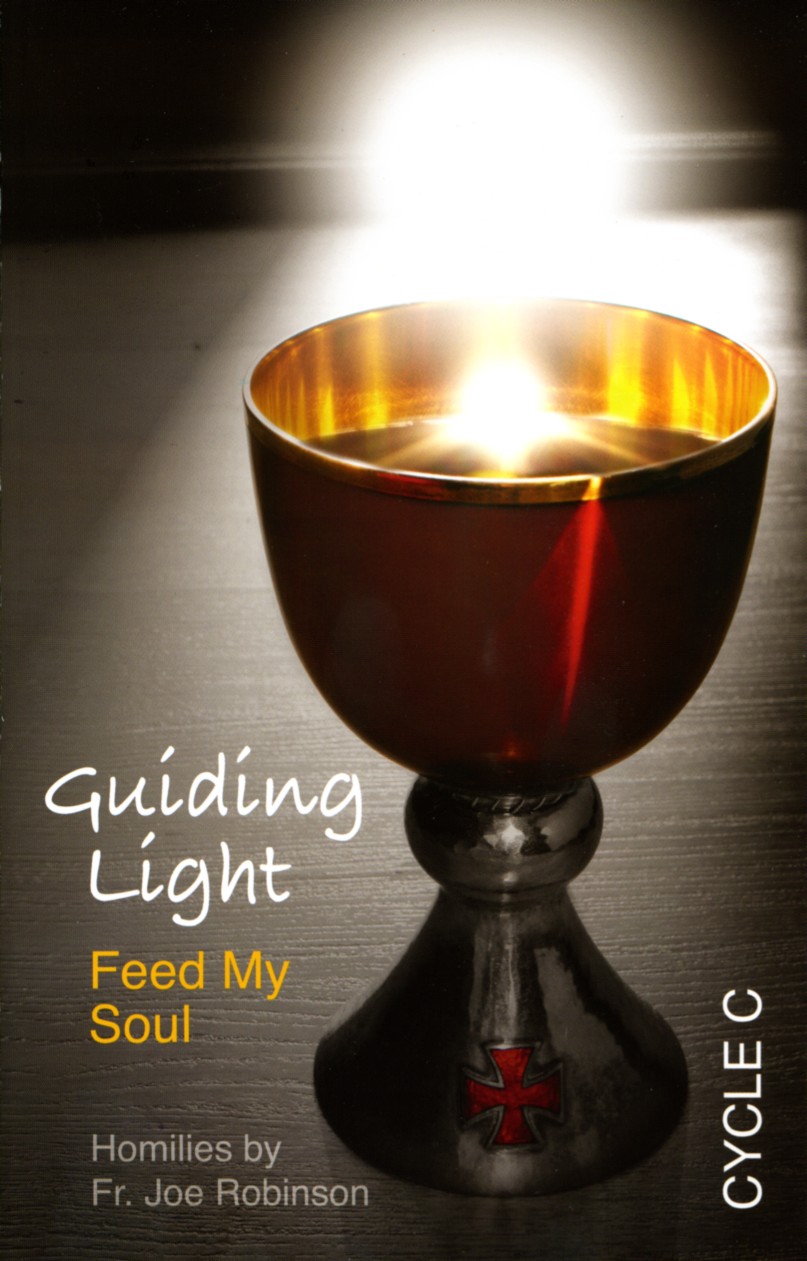
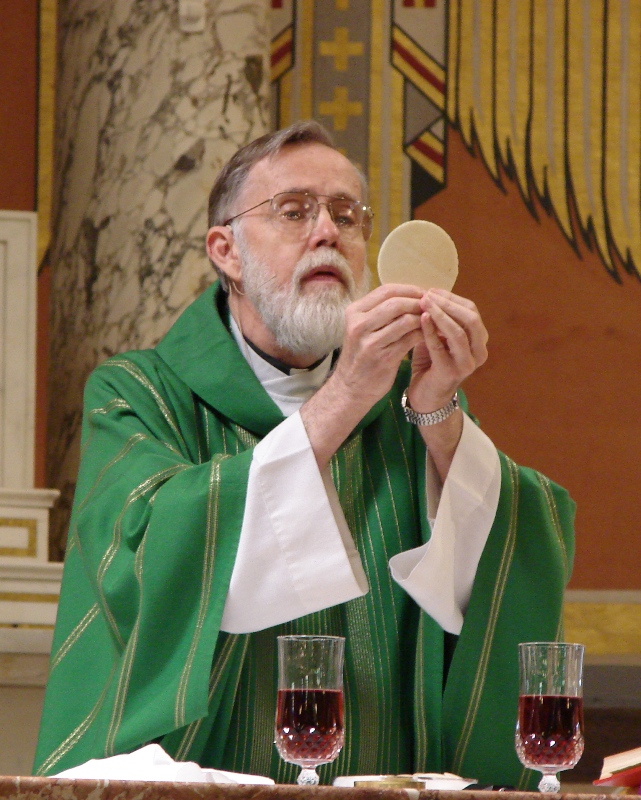
1st Sunday of Advent
Jeremiah 33: 14-16
“Look, the days are coming, Yahweh declares, when I shall fulfil the promise of happiness I made to the House of Israel and the House of Judah:
In those days and at that time,
I shall make an upright Branch
grow for David,
who will do what is just and upright
in the country.
In those days Judah will triumph
and Israel live in safety.
And this is the name the city will be called:
Yahweh–is–our–Saving–Justice.”
December 3, 2006
INTRODUCTION
The prophet, Jeremiah, lived during one of the most devastating times in the history of Israel. He witnessed the destruction of Jerusalem and the Temple by the Babylonians. He saw many of his fellow citizens enslaved and taken into exile. Yet his words reflect hope and not despair. His hope is based not on human capabilities but on God's faithfulness to God’s promises. Jeremiah recalls God’s promise to his people made over 400 years earlier, during the time of King David, that God would bring to the throne a successor to the King who would bring peace and security to Jerusalem. We still wait for peace and security not only in Jerusalem but all over the world, but the promised one, a descendant of the House of David has begun his reign. The gospel tells us one day he will come in great glory to establish the kingdom of God forever.

Baruch 5: 1-9
Jerusalem, take off your dress of sorrow
and distress,
put on the beauty of God’s glory
for evermore,
wrap the cloak of God’s saving justice
around you,
put the diadem of the Eternal One’s glory
on your head,
for God means to show your splendour
to every nation under heaven,
and the name God gives you
for evermore will be,
‘Peace–through–Justice,
and Glory–through–Devotion’.
Arise, Jerusalem, stand on the heights
and turn your eyes to the east:
see your children reassembled
from west and east
at the Holy One’s command,
rejoicing because God has remembered.
Though they left you on foot
driven by enemies,
now God brings them back to you,
carried gloriously, like a royal throne.
For God has decreed the flattening
of each high mountain,
of the everlasting hills,
the filling of the valleys
to make the ground level
so that Israel can walk safely
in God’s glory.
And the forests and every fragrant tree
will provide shade
for Israel, at God’s command;
for God will guide Israel in joy
by the light of his glory,
with the mercy and saving justice
which come from him.
December 10, 2006
INTRODUCTION: In today’s first reading, we hear from Baruch, the secretary of Jeremiah the prophet and apparently a prophet himself. He lived during the Babylonian exile over 500 years before Christ. When the Babylonians conquered Jerusalem, they destroyed everything and took most of its citizens to Babylon as captives. The prophet Baruch addresses Jerusalem and tells the city to rejoice, God will bring back the captives and Jerusalem will prosper again.
HOMILY: . . . The Jews at the time of John the Baptist, 500 years later, were not a free people. They had their Temple; Jerusalem had been rebuilt. But they were part of the great Roman Empire. Rome made the rules, Rome collected their taxes (and they were heavily taxed), Roman soldiers marched through their streets and a Roman governor who was noted for his brutality, named Pontius Pilate, controlled their land. Most of us think of Pilate as sympathetic or just plain weak because of the way he handled Jesus when Jesus was arrested. Most of us do not know that in a couple of years Pilate would lose his job because his Roman bosses, who were not nice people themselves, considered him too ruthless and violent. But the prophet John the Baptist saw beyond all their oppression as he quotes from the prophet Isaiah: “all flesh shall see the salvation of God.” ...
3rd Sunday of Advent
Zephaniah 3: 14-18
Shout for joy, daughter of Zion,
Israel, shout aloud!
Rejoice, exult with all your heart,
daughter of Jerusalem!
Yahweh has repealed your sentence;
he has turned your enemy away.
Yahweh is king among you, Israel,
you have nothing more to fear.When that Day comes,
the message for Jerusalem will be:
Zion, have no fear,
do not let your hands fall limp.
Yahweh your God is there with you,
the warrior–Saviour.
He will rejoice over you with happy song,
he will renew you by his love,
he will dance with shouts of joy for you,
as on a day of festival.
December 17, 2006
INTRODUCTION: Our theme for today, as it often is, is summed up in the Psalm Refrain: “Cry out with joy and gladness, for among you is the great and holy one of Israel.” Our first reading from the prophet Zephaniah goes back about 700 years before Christ. The Assyrians were the dominant force in the Middle East and were an unusually warlike, brutal people. Their capital city was in northern Iraq near modern day Mosul. Our first reading comes from a time shortly after the Assyrians wiped out the northern part of Israel. They brought severe suffering upon the southern part of Israel too, the area around Jerusalem, but they did not conquer it. Jerusalem would still stand for another 130 years until the Babylonians conquered it. The Babylonian empire, as you might remember, was centered around Baghdad and it was after they destroyed the Assyrian empire that they moved on to conquer many other nations in the Middle East which included Judah and Jerusalem. (It sounds very much like what’s going on over there today, doesn’t it?) Meanwhile back to Zephaniah 700 years before Christ after the northern part of Israel had been devastated. Jerusalem was struggling to recover from the near destruction they had suffered, but they didn’t learn their lesson. Idolatry and immorality were rampant among the Jews. The king of Judah himself offered his own son as a human sacrifice to the pagan gods. Most of Zephaniah’s book records his efforts to correct abuses among God’s people. His book ends on a note of hope, however, as he addresses those who are faithful to God. He tells them to rejoice and assures them God will rejoice and sing too because of his love for them and for all the blessings that will be theirs. Can any of us begin to imagine what it would sound like to hear God singing?
There is something we should be aware of when we hear the second reading too. St. Paul is sitting in prison somewhere when he wrote this, and prisons in those days were really bad. Today’s prisons would look like a luxury hotel by comparison. Yet Paul can be joyful and he is able to encourage the Philippians to have no anxiety and to rejoice always.

2nd Sunday of Ordinary Time
Isaiah 62: 1-5
The splendour of Jerusalem
About Zion I will not be silent,
about Jerusalem I shall not rest
until saving justice dawns for her
like a bright light
and her salvation like a blazing torch.
The nations will then see
your saving justice,
and all kings your glory,
and you will be called a new name
which Yahweh's mouth will reveal.
You will be a crown of splendour
in Yahweh's hand,
a princely diadem in the hand of your God.
No more will you be known as 'Forsaken'
or your country be known as 'Desolation';
instead, you will be called
'My Delight is in her'
and your country 'The Wedded';
for Yahweh will take delight in you
and your country will have its wedding.
Like a young man marrying a virgin,
your rebuilder will wed you,
and as the bridegroom rejoices in his bride,
so will your God rejoice in you.
January 14, 2007
INTRODUCTION: Five hundred thirty years before Christ the Jews were exiles in Babylon. You’ve heard me mention this many, many times. Today’s first reading is an announcement from the prophet that the Persians, who had conquered the Babylonians, were going to let God’s people go home. Their cities and homes were in ruins during the time of their exile and the Persians were even willing to give them some material help to rebuild. God said he would forgive the sins of his people, their sins that brought on their exile, and God would take them back. God would make Jerusalem and Judea his spouse. The image of God marrying his people is an important biblical image and is the best symbol from our human experience that can be used to describe the love and intimacy God desires to have with his people. The image prepares the way for gospel account of the marriage feast of Cana.

Third Sunday in Ordinary Time
Nehemiah 8: 2-4a, 5-6, 8-10
Accordingly, on the first day of the seventh month, the priest Ezra brought the Law before the assembly, consisting of men, women and all those old enough to understand. In the square in front of the Water Gate, in the presence of the men and women, and of those old enough to understand, he read from the book from dawn till noon; all the people listened attentively to the Book of the Law.
The scribe Ezra stood on a wooden dais erected for the purpose;
In full view of all the people — since he stood higher than them all — Ezra opened the book; and when he opened it, all the people stood up. Then Ezra blessed Yahweh, the great God, and all the people raised their hands and answered, 'Amen! Amen!'; then they bowed down and, face to the ground, prostrated themselves before Yahweh.
Ezra read from the book of the Law of God, translating and giving the sense; so the reading was understood. Then His Excellency Nehemiah and the priest-scribe Ezra and the Levites who were instructing the people said to all the people, 'Today is sacred to Yahweh your God. Do not be mournful, do not weep.' For the people were all in tears as they listened to the words of the Law. He then said, 'You may go; eat what is rich, drink what is sweet and send a helping to the man who has nothing prepared. For today is sacred to our Lord. Do not be sad: the joy of Yahweh is your stronghold.'
January 21, 2007
INTRODUCTION – You’ve heard frequently of the Babylonian exile and how the Persians conquered the Babylonians fifty years later and allowed the Jews to return home. Many of the Jews in Babylon had become rather comfortable there and they did not return to Israel all at once. Little by little they came. Even a hundred years after they began to return they were still struggling to rebuild their cities and their civilization. The Persians were still in control of the entire Middle East which included Israel. Nehemiah, a Jew, had been a high level servant to the king of Persia and he asked his king to allow him to return to Israel to help his people rebuild. So the king of Persia appointed him to be governor of Israel. In Nehemiah’s efforts to rebuild the nation, he had to start with what was most important and that was to remind the people that God had to take first place in their lives. He realized much of the trauma his people had gone through at the time of their exile was because they had forgotten their God. In today’s first reading Nehemiah called for a general assembly of the people and the priest Ezra read God's word to them. Remember, ordinary people did not have books in those days. Books were very rare and very expensive, since each one had to be individually written word by word. So, if the ordinary person were ever to know God's word, someone had to read it or preach it to them. Ezra, thus, read God's word to the people and interpreted it for them. The reading was most probably from the first five books of the bible. Notice that there was active participation on the part of God’s people as they heard the word, possibly for the first time: raising their hands, answering “amen,” bowing to the ground, listening attentively, weeping and rejoicing.
HOMILY - The central theme of today’s liturgy is God's word. The people were saddened by God's word in today’s first reading. Perhaps they recognized how they had failed to live up to it. But Ezra and Nehemiah told the people God's word should bring us joy. Even if they had not been living by God’s word, on hearing it they could learn from it and start living as God instructed them. When we break the laws of our society, we may get thrown into jail. God doesn’t send the police around when we break his laws, but when we ignore his word, it’s going to catch up with us in the long run. So many people rationalize bad behavior by saying Jesus is a good guy. He won’t punish me for this or that. But they forget, Jesus didn’t come to punish us. He came to show us the way to happiness and eternal life. When we choose a way contrary to his teaching we bring unhappiness upon ourselves.
One of my favorite psalm verses is: “Your word is a lamp for my steps and a light for my path.” (Ps 119, 105) If you have to go somewhere in the dark, it’s nice to have a flashlight to help you see where you’re going. You can walk in the dark if you wish, but that would not be very smart and you might be likely to end up hurting yourself. When we try to make it through life without God's word, we’re walking in the dark. We can’t say God is punishing us if, while we’re walking in the dark, we run into something or we fall. We did it to ourselves. ...
6th Sunday of Ordinary Time
Jeremiah 17: 5-8
A group of wisdom sayings
Yahweh says this,
Accursed be anyone
who trusts in human beings,
who relies on human strength
and whose heart turns from Yahweh.
Such a person is like scrub
in the wastelands:
when good comes, it does not affect him
since he lives in the parched places
of the desert,
uninhabited, salt land.
‘Blessed is anyone who trusts in Yahweh,
with Yahweh to rely on.
Such a person is like a tree by the waterside
that thrusts its roots to the stream:
when the heat comes it has nothing to fear,
its foliage stays green;
untroubled in a year of drought,
it never stops bearing fruit.
February 11, 2007
INTRODUCTION:
Life is full of options for people in the world today, but the Bible tells us that all our options ultimately will be reduced to two. We either make God the center of our lives or we don’t. Choosing to make God the center of our lives will lead to true happiness, making any other choice may satisfy us temporarily, but it will in the end leave us disappointed and unhappy. This was crystal clear to Jeremiah the prophet who lived at the time of the Babylonian exile. His way of expressing this truth is crystal clear too.

5th Sunday of Lent
Isaiah 43: 16-21
Thus says Yahweh,
who made a way through the sea,
a path in the raging waters,
who led out chariot and horse
together with an army of picked troops:
they lay down never to rise again,
they were snuffed out, put out like a wick.
No need to remember past events,
no need to think about
what was done before.
Look, I am doing something new,
now it emerges; can you not see it?
Yes, I am making a road in the desert
and rivers in wastelands.
The wild animals will honour me,
the jackals and the ostriches,
for bestowing water in the desert
and rivers on the wastelands
for my people, my chosen one, to drink.
The people I have shaped for myself
will broadcast my praises.
March 25, 2007
INTRODUCTION - Imagine you have been captured by radical Moslems in Iraq, and turned into a slave. Then God sends you a message through a holy person that you will soon be liberated and would be able to come back home. Well, if you can imagine how you would feel, you can imagine how the Jews felt when Isaiah the prophet spoke to them the words in today’s first reading. At that time in history, 500 years before Christ, the land we now know as Iraq was known as Babylon. The Jews were their captives and slaves. God tells them their release from the Babylonians would be no less spectacular than their release from slavery in Egypt centuries earlier. Even as the prophet speaks, he tells them the road back to their own land is being made ready. God’s statement “see, I am doing something new” leads us into the gospel, where we see Jesus taking a new approach to sinners. He did not come to condemn but to save. His kindness to a woman caught in adultery freed her from both the death sentence and from her sins.
22nd Sunday in Ordinary Time
Jeremiah 20: 7-9
You have seduced me, Yahweh,
and I have let myself be seduced;
you have overpowered me:
you were the stronger.
I am a laughing-stock all day long,
they all make fun of me.
For whenever I speak, I have to howl
and proclaim, ‘Violence and ruin!’
For me , Yahweh’s word has been the cause
of insult and derision all day long.
I would say to myself,
‘I will not think about him,
I will not speak in his name any more,’
but then there seemed to be a fire
burning in my heart,
imprisoned in my bones.
The effort to restrain it wearied me,
I could not do it.
August 28, 2005
INTRODUCTION: (Jeremiah 20, 7-9) Our first reading goes back about 600 B.C. The author of our passage is the prophet Jeremiah. Apparently he thought that people would be grateful to him for speaking God’s word to them. But his job of telling them to change their ways and get right with God only made them hate him. The people ridiculed him, threw him in jail and even tried to kill him. We hear him complaining to God “You duped me! You tricked me, God!” I’m sure it wasn’t the first time God heard the complaint that life is not fair. Jesus’ faithfulness to his mission would bring him suffering too, but Jesus was well aware of what was going to happen to him as we hear him warn his disciples in today’s gospel. In last Sunday’s gospel Jesus praised Peter for acknowledging Jesus as the Messiah. Jesus even promised Peter the keys to the kingdom of heaven. But Peter wasn’t ready for all this talk about suffering and when Peter tried to talk Jesus out of the idea Jesus called him Satan. That’s because Peter was trying to tempt Jesus away from being faithful to his calling.
23rd Sunday in Ordinary Time
Ezekiel 33: 7-9
Son of man I have appointed you as watchman for the House of Israel. When you hear a word from my mouth, warn them from me. If I say to someone wicked, "Evil- doer, you are to die," and you do not speak to warn the wicked person to renounce such ways, the wicked person will die for this guilt, but I shall hold you responsible for the death. If, however, you do warn someone wicked to renounce such ways and repent, and that person does not repent, then the culprit will die for this guilt, but you yourself will have saved your life.
September 4, 2005
INTRODUCTION - (Ezekiel 33, 7-9) (Romans 13, 8-10) (Matthew 18, 15-20) Our first reading takes us back six hundred years before Christ as God explains to his prophet Ezekiel his responsibility as a prophet. He must warn God’s people of their sinful ways or he will be held accountable. It is a prelude to the gospel where Jesus instructs his followers how to help each other stay on the right track. St. Paul’s teaching on love in our second reading reminds us that if we should try to correct one another it should be done out of love.
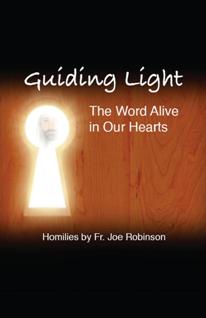
26th Sunday in Ordinary Time
Ezekiel 18: 25-28
‘Now, you say, "What the Lord does is unjust." Now listen, House of Israel: is what I do unjust? Is it not what you do that is unjust? When the upright abandons uprightness and does wrong and dies, he dies because of the wrong which he himself has done. Similarly, when the wicked abandons wickedness to become law–abiding and upright, he saves his own life. Having chosen to renounce all his previous crimes, he will most certainly live: he will not die.
September 25, 2005
INTRODUCTION – (Ezekiel 18, 25-28) (Matthew 21, 28-32) In 587 B.C. when the Babylonians conquered the Jews, destroyed their cities and Temple and farms and took them off to Babylon as their slaves, the conquered Jews concluded they were being punished for the sins of their ancestors. They complained God was unfair. In today’s first reading from Ezekiel, God addresses the Jews during their exile. God tells them they brought this disaster on themselves by their own sins. But the situation was not hopeless. They could always turn back to God if they wanted. This reading prepares us for the gospel where we hear a similar message. If we have damaged our relationship with God, we can always turn back.

29th Sunday in Ordinary Time
Isaiah 45: 1, 4-6
Thus says Yahweh
to his anointed one,
to Cyrus whom, he says,
I have grasped by his right hand,
to make the nations bow before him
and to disarm kings,
to open gateways before him
so that their gates be closed no more:It is for the sake of my servant Jacob
and of Israel my chosen one,
that I have called you by your name,
have given you a title
though you do not know me.
I am Yahweh, and there is no other,
there is no other God except me.
Though you do not know me,
I have armed you
so that it may be known from east to west
that there is no one except me.
I am Yahweh, and there is no other,
October 16, 2005
INTRODUCTION: (Isaiah 45, 1.4-6; Mt. 22, 15-21) The Babylonians lived in the land we now know as Iraq, 600 years before Christ. The capital city of Babylon was just less than 100 miles south of modern day Baghdad. 587 years before Christ the Babylonians conquered the Jews and enslaved most of the Jews and took them as captives to Babylon. At that time the Persians lived in modern day Iran. Fifty years after the Babylonians conquered the Jews, the Persians conquered the Babylonians. The Persian king, Cyrus, allowed the Jews to return to their Israel. He even encouraged them to rebuild their temple to Yahweh. The prophet Isaiah, in today’s first reading, sees the hand of God at work in all these events. He calls this pagan king, Cyrus, God's anointed. And although Cyrus thought it was by his own strength and shrewdness that he conquered the Babylonians, Isaiah said this was God’s doings. Isaiah stresses the absolute supremacy of God, a theme in today’s liturgy.
Give a gift that lasts.


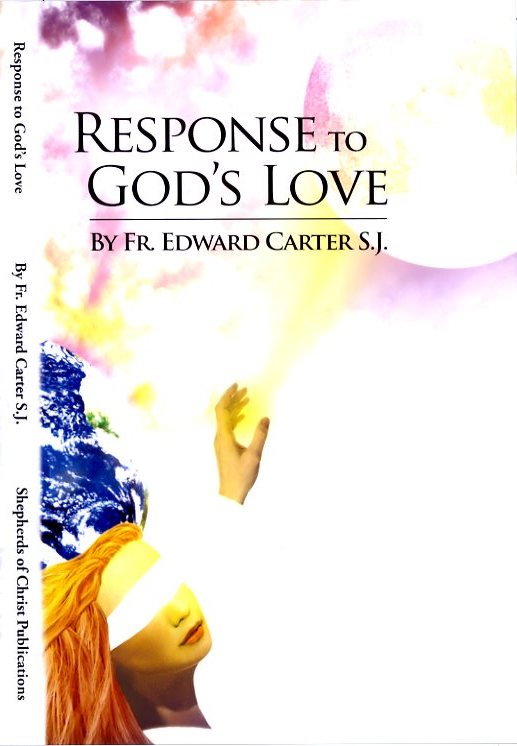

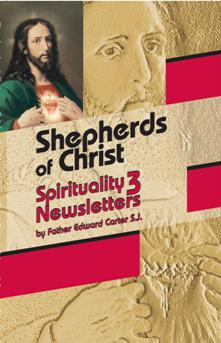
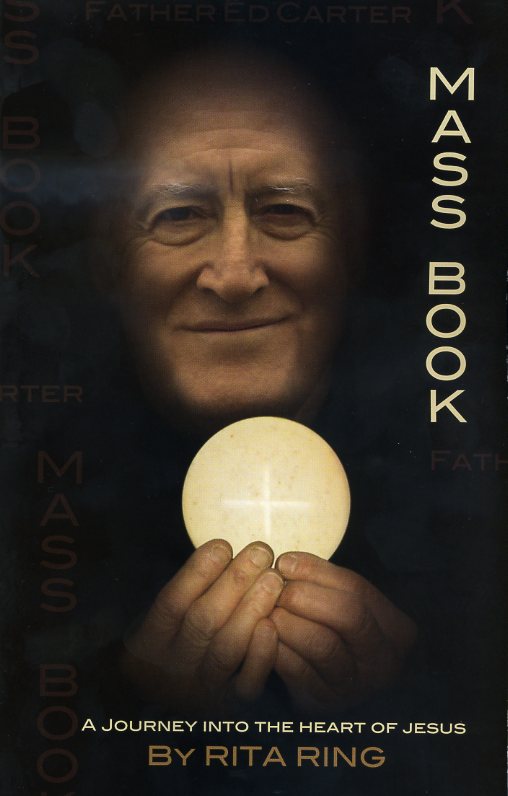
$10.00 each plus shipping
Call 1-888-211-3041
Shepherds of Christ
We can send Fr. Joe's
homily book to a priest for 75¢.
Can you please help us get
these homilies to the priests?

Please help us with your donation.
Call Shepherds of Christ
1-888-211-3041
NEW! — 11" St. Michael - $40.00 plus shipping
Prayer Cards available
Holy Spirit Prayer Act of Consecration to
Immaculate Heart of MaryAct of Consecration to
Sacred Heart of JesusPrayer for Priests
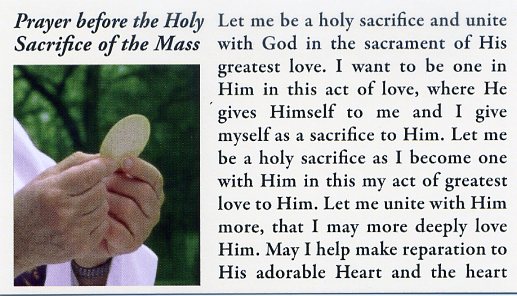 |
| Prayer before the Holy Sacrifice of the Mass |
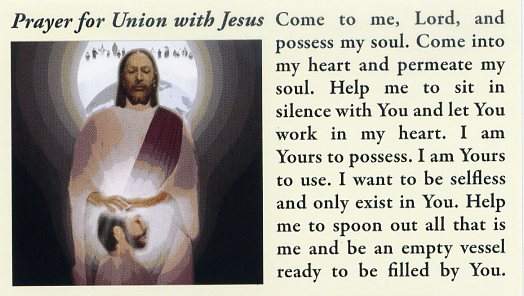 |
|
Prayer for Union with Jesus |
Available for .25¢ each plus postage
Call Shepherds of Christ
1-888-211-3041
Prayer Card 4" x 6"
.50¢ each plus postage
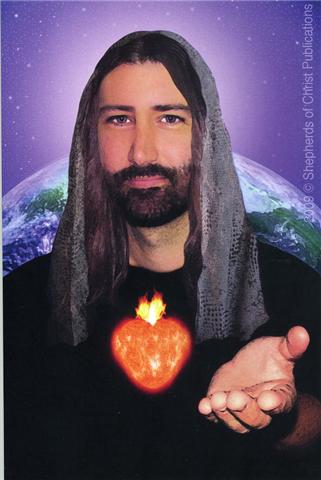

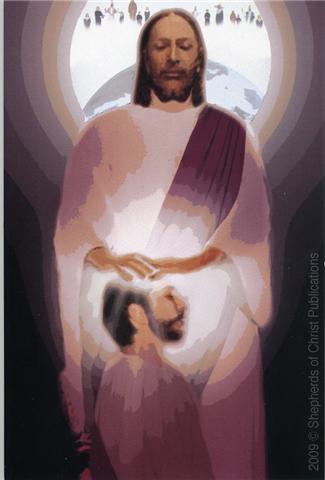
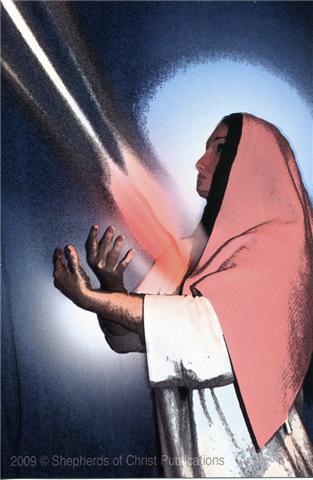

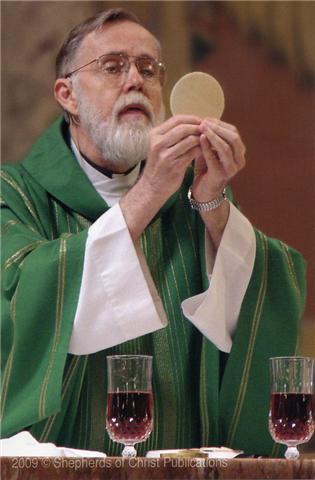
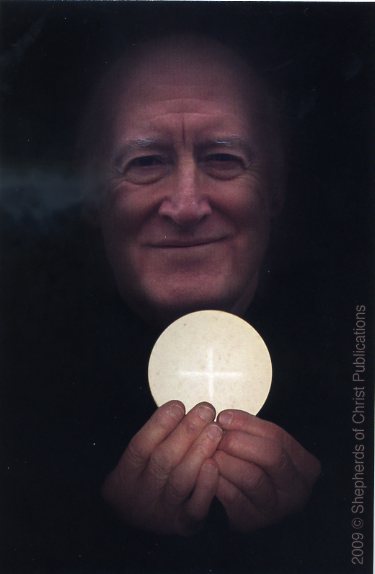
size 5 1/2" x 8 1/2"
$1.00 plus postage
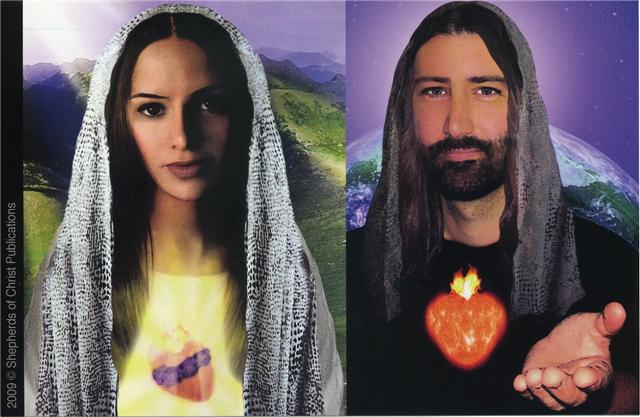
Statues
Sacred Heart of Jesus w/glass - 18
Our Lady-Guadalupe w/glass - 12
Limpias - 8
Immaculate Heart w/glass - 18
I Heart - Ivory w/glass - 18
Our Lady of Grace w/glass - 18
Our Lady-Mt. Carmel w/glass - 18
Our Lady of Lourdes w/glass - 18
Infant of Prague w/glass - 24
Sacred Heart of Jesus w/glass - 24
Sacred Heart -Blessing w/glass - 24
Sorrowful Mother w/glass - 24
I Heart - Ivory w/glass - 24
I Heart of Mary w/glass - 24
Our Lady of Lourdes w/glass - 24
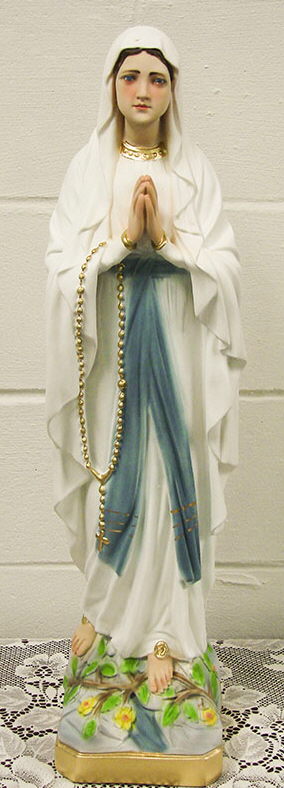
Our Lady-Guadalupe w/glass - 28
Our Lady of Grace w/glass - 24
Our Lady-Mt. Carmel w/glass - 24
Fatima w/glass - 11
Pilgrim Virgin w/glass - 12
Pilgrim Virgin w/glass - 15
Fatima w/glass - 18
Pilgrim Virgin w/glass - 18
Pilgrim Virgin w/glass - 27
St. Padre Pio
St. Joseph
St. Therese
St. Francis
St. Anthony
St. Claire
Limpias
St. Jude
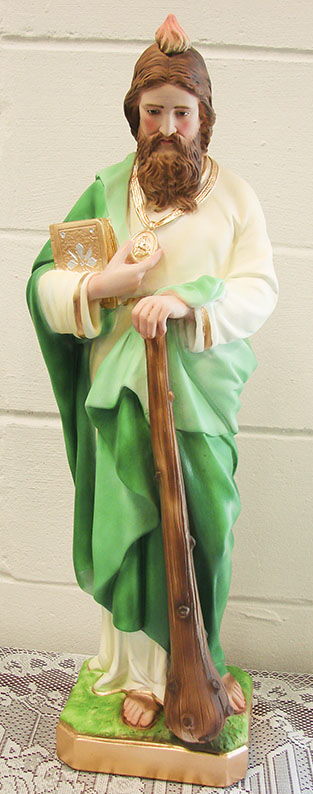
Divine Mercy
Holy Family
Angel
St. Philomena
Pieta - Marble
Pieta - Color
Holy Family
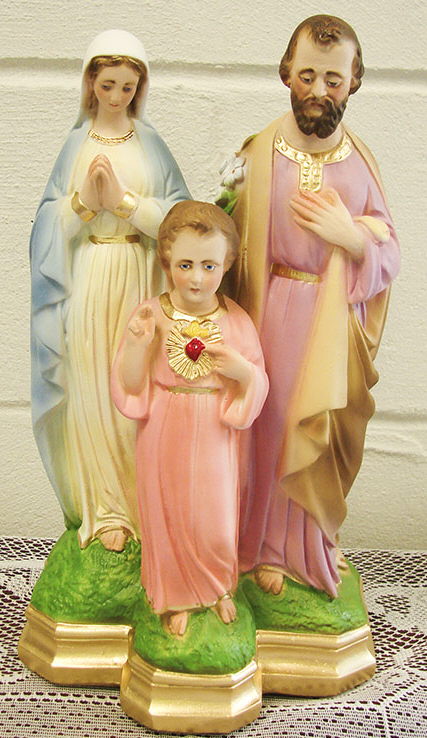
St. Anthony - 18
St. Francis - 18
St. Joseph - 18
St. Therese - 18
St. Rita - 18
St. Clare - 12
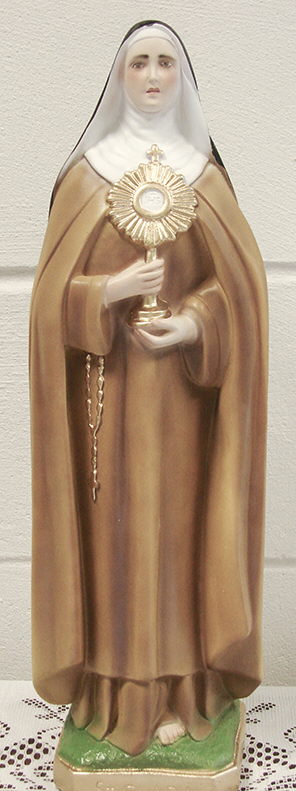
St. Rita - 12
St. Padre Pio - 12
Divine Mercy - 12
Shepherds of Christ Ministries
P. O. Box 627
China, IN 47250
Toll free - 1-888-211-3041
Local - 1-812-273-8405
fax - 1-812-273-3182
web: www.sofc.org
e-mail: info@sofc.org
Size Price Quantity Holy Family
24"
$180
Limpias
24"
$125
St. Anthony
24"
$125
St. Claire
24"
$125
St. Francis
24"
$125
St. Joseph
24"
$125
St. Jude
24"
$125
St. Padre Pio
24"
$125
St. Therese
24"
$125
Divine Mercy 22"
$125 Angel 22"
$100 St. Philomena 20"
$100 St. Philomena 16"
$65 St. Joseph 18"
$65 St. Francis 18"
$65 St. Anthony 18"
$65 St. Rita 18"
$65 St. Therese 18"
$65 Pieta - Color 15" $75 Pieta - Marble 15" $75 Holy Family 12"
$60 St. Padre Pio - standing 12"
$40 St. Padre Pio - sitting 8"
$50 St. Rita 12"
$40 Divine Mercy
12"
$40 St. Claire 12"
$40 Limpias 8"
$25 Our Lady of Guadalupe w/glass 28"
$500 Our Lady of Mt. Carmel w/glass 24"
$500 Immaculate Heart of Mary w/glass
24"
$500 Immaculate Heart - Ivory w/glass
24"
$500 Infant of Prague w/glass
24"
$500 Our Lady of Grace w/glass
24"
$500 Our Lady of Lourdes w/glass
24"
$500 Sacred Heart of Jesus w/glass 24"
$500 Sacred Heart -Blessing w/glass 24"
$500 Sorrowful Mother w/glass
24"
$500 Immaculate Heart of Mary w/glass 18"
$300 Immaculate Heart - Ivory w/glass 18"
$300 Sacred Heart of Jesus w/glass 18"
$300 Our Lady of Lourdes w/glass 18"
$300 Our Lady of Grace w/glass 18"
$300 Our Lady of Mt. Carmel w/glass
18" $300 Our Lady of Guadalupe w/glass 12"
$200 Fatima w/glass
11"
$150 Fatima w/glass
18"
$250 Pilgrim Virgin w/glass 12"
$160 Pilgrim Virgin w/glass 15" $200 Pilgrim Virgin w/glass 18" $250 Pilgrim Virgin w/glass 27"
$450
Call for Shipping Price (1-888-211-3041)
Name
Sub-Total Address
IN Tax (7%) City
Shipping State Zip
Donation Telephone
Order Total
Shepherds of Christ
P. O. Box 627
China, IN 47250
Call Shepherds of Christ
1-888-211-3041
Fr. Joe's Homily Books
Guiding Light - Cycle A
The Word Alive in Our Hearts$10.00
Guiding Light - Cycle B
Focusing on the Word$10.00
Guiding Light - Cycle C
Feed My Soul$10.00
Fr. Carter's Books
Priestly Newsletter Book I
12 Newsletters
July 1994 - June 1996$12.00
Priestly Newsletter Book 2
17 Newsletters
1996 - 1999$12.00
Priestly Newsletter Book 3
4 Newsletters & Prayers
2000$12.00
Response to God's Love
$10.00
Messages given
by Jesus and Mary 1994
Tell My People
$10.00
The Pain and the Joy
$10.00
Synopsis of the Spiritual Life
Spirituality Handbook
$3.00
Priestly Newsletter on CD
2000 - Issue 1
$10.00
Priestly Newsletter on CD
2000 - Issue 2
$10.00
Fr. Pasquini's Books
Authenticity
Prayers and Meditations
$10.00In Imitation of Two Hearts
For those suffering or
in Nursing Homes
$10.00Light, Happiness and Peace
Journeying through traditional
Catholic Spirituality$10.00
Medicine of Immortality
Prayers and Meditations - will assist the reader in growth toward a deeper understanding of the mystery of the Eucharist
$10.00
Ecce Fides - Pillar of Truth
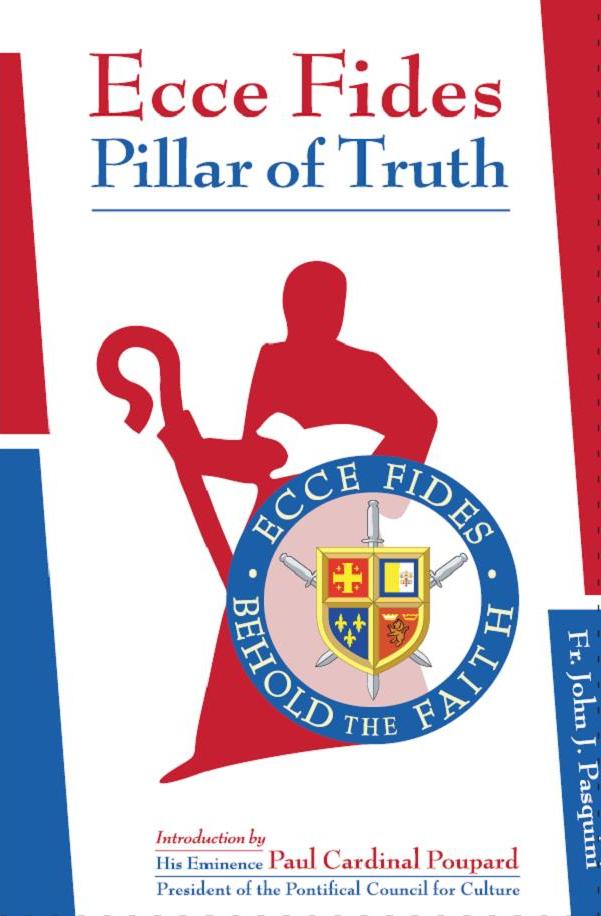
Ideal for RCIA, Adult & Youth Bible Study, Homeschooling, Catholic
Identity Studies$10.00
Shepherds of Christ Newsletters
9 Newsletters
2006 - 2008
$36.00
DVDs and CDs by Fr. Pasquini
Authenticity DVD
Prayers on the Ocean$10.00
Nursing Home Mass DVD
$10.00
Consolation DVD
$10.00
Medicine of Immortality
Read by Rita Ring2 CDs - $17.00
In Imitation of Two Hearts DVD
$10.00
Consolation CD
by Fr. John$8.00
Nursing Home Mass CD
$8.00
Holy Spirit Novena DVD
$10.00
Divine Mercy Chaplet DVD
$10.00
plus shipping
Call Shepherds of Christ
1-888-211-3041
Available for $10.00 plus postage
1-888-211-3041
Call Shepherds of Christ
God’s Blue Books
God’s Blue Book 1 –
Teachings to Lift You Up$10.00
God’s Blue Book 4 –
The Love of the Hearts of
Jesus and Mary$5.00
God’s Blue Book 2 –
The Fire of His Love$10.00
God’s Blue Book 5 –
So Deep Is the Love of His Heart$5.00
God’s Blue Book 3 –
Love God, Love One Another
(Fr. Carter's favorite)
$10.00
God’s Blue Book 6 –
He Calls Us to Action$10.00
Rosary Books
We are trying to get
Response to God's Love
and the Mass Book out.
Anybody who wants to help us
with a donation to get these 2 books
out in the Priestly/hierarchy mailing —
Please call Shepherds of Christ
1-888-211-3041
July 31, 1994
Words of Jesus to Members of
Shepherds of Christ Associates:"My beloved priest-companion, I intend to use the priestly newsletter, Shepherds of Christ, and the movement, Shepherds of Christ Associates, in a powerful way for the renewal of My Church and the world.
"I will use the newsletter and the chapters of Shepherds of Christ Associates as a powerful instrument for spreading devotion to My Heart and My Mother's Heart.
"I am calling many to become members of Shepherds of Christ Associates. To all of them I will give great blessings. I will use them as instruments to help bring about the triumph of the Immaculate Heart and the reign of My Sacred Heart. I will give great graces to the members of Shepherds of Christ Associates. I will call them to be deeply united to My Heart and to Mary's Heart as I lead them ever closer to My Father in the Holy Spirit."
- Message from Jesus to Father Edward J. Carter, S.J., Founder, as given on July 31, 1994,
feast of Saint Ignatius Loyola, Founder of the Society of Jesus (The Jesuits)
The China Church is over 140 years old
and we pray in there 24 hours a day.
It needs stucco and so does
the community building.
Can you please help us?
Call Shepherds of Christ
1-888-211-3041
Likewise the priest house
is 150 years old.
Jesus told us to repair it
which we have been doing.
We need $13,000.00 for this work.
You can help put the Blue Book V
in the hands of 1,000 people
we need $1,200 postage for this
It is ready to go
Call Shepherds of Christ
1-888-211-3041
Crucifix — hand carved by Felix
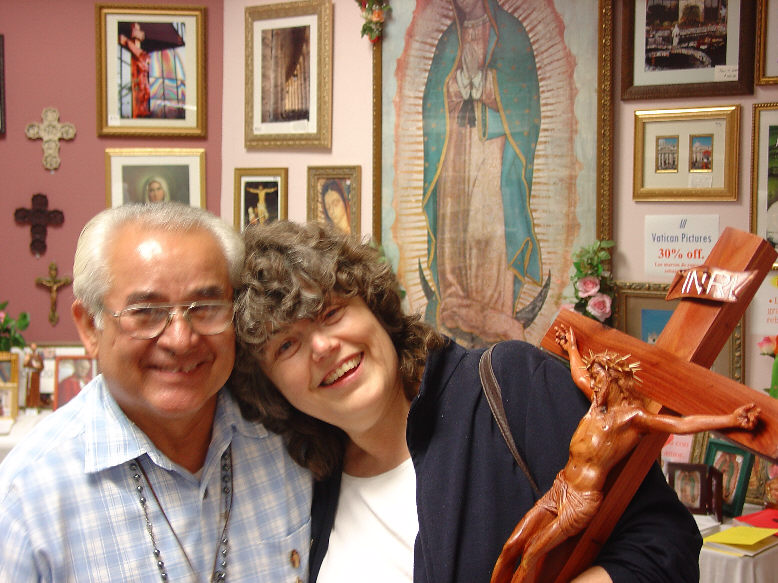
Available for $750.00
Brand New Internet Store